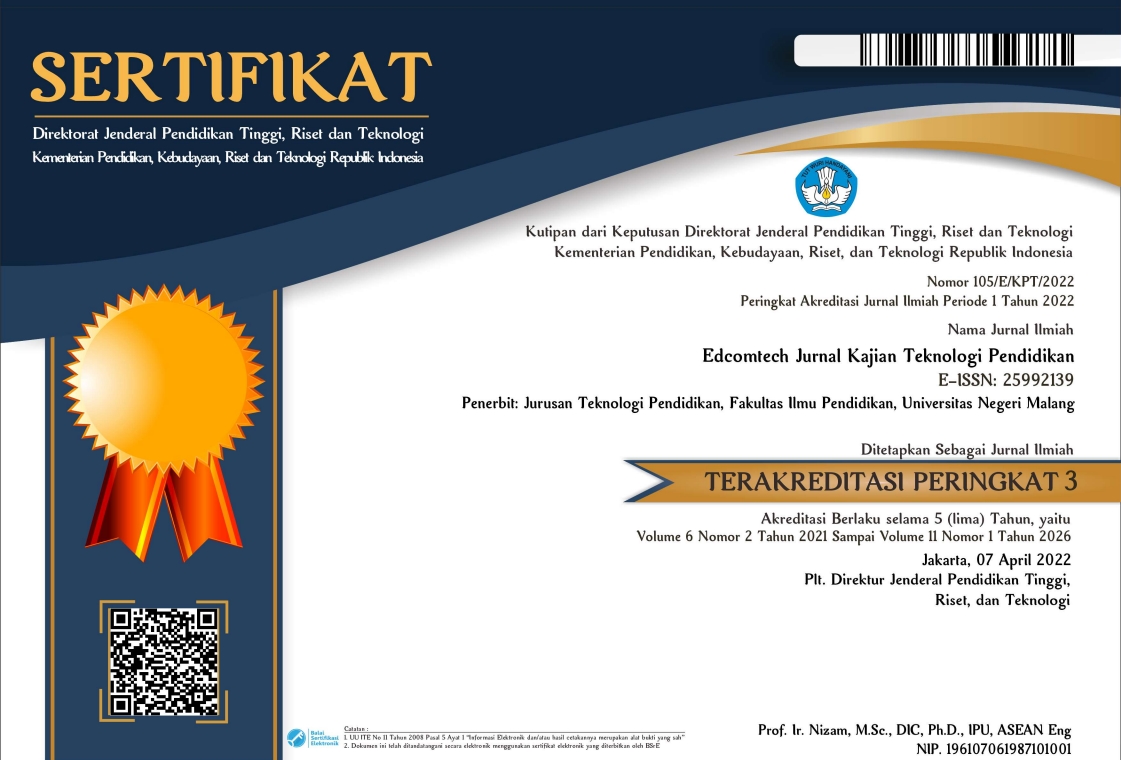Developing Instructional Game "Adventure of Word" to Improve Morphological Awareness on Vocational Higher Students
Abstract
Abstract: Morphological awareness (MA) has relation to language development. Most of Informatics students class of 2017 in Politeknik Kota Malang are lack of MA especially in vocabulary and reading comprehension. Therefore, this present study is aimed at developing instructional game “Adventure of Word” to improve morphological awareness. This is Research & Development study which used Lee & Owens’ development model. From the result of expert validation, from media expert it got 96.8% and from media/design expert it got 78.7%. As those results, the product is categorized as ‘valid’. After the product has been validated, the next step is try-out to the students. It got 96.6% which meant the product is classified as ‘excellent’. It can be concluded that the product was well-developed as instructional media to teach morphology explicitly so that can help students to improve their morphological awareness especially in root word, prefix, suffix, and circumfix.
Keywords
Full Text:
PDFReferences
Amirjali, F. & Jabbari, A. A. (2018). The Impact of Morphological Instruction on Morphological Awareness and Reading Comprehension of EFL Learners. Teacher Education & Development, 5, 1-30
Afram, R. (2013). Puzzle design in adventure games. Retrieved from https://uu.diva-portal.org/smash/get/diva2:629026/FULLTEXT01.pdf
Akbulut, D. F. (2017). Effects of morphological awareness on second language vocabulary knowledge. Journal of Language and Linguistic Studies 13(1), 10-26.
Akdogan, E. (2017). Developing vocabulary in game activities and game materials. Journal of Teaching and Education 7(1), 31-66.
Allsop, Y. & Jessel, J. (2015). Teacher’s experience and reflections on game-based learning in the primary classroom. International Journal of Game-Based Learning 5(1), 1-17.
Bangs, K. E., & Binder, K. S. (2016). Morphological awareness intervention: improving spelling, vocabulary, and reading comprehension for adult learners. 5 (1), 49-56.
Blanco, A. Marchiori, E. Fernandez-Manjon, B. (2014). Adventure games and language learning. Retrieved from https://www.researchgate.net/publication/265037130
Brown, J. D. (1995). The elements of language curriculum: a systemic approach to program development. Boston: Heinle & Heinle Publishers
Carlisle, J. F., (2010). Effects on instruction in morphological awareness on literacy achievement: an integrative review. 45(4), 464-487.
Deng, Q. & Trainin, G. (2014). The effect of morphological strategies training for English language learners. Faculty Publications: Department of Teaching, Learning and Teacher Education. 169.
Fromkin, V., Rodman, R., Collins, P., Blair, D., (1996). An Introduction to Language. Sydney: Harcourt Brace & Company.
Haspelmath, M., & Sims, A. (2010). Understanding morphology. UK: Hodder Education
Heinich, R., Molenda, M. Russel J., & Smaldino, S. (2002). Instructional media and technologies for learning. New Jersey: Merrill Prentice Hall.
Jiang, Y. B., Kuo, L.-J., & Sonnenburg-Winkler, S. (2015). Morphological Awareness and Reading Comprehension : A Qualitative Study with Adult EFL Learners. International Journal of Language and Linguistics, 2(5), 18–26.
Lee, W., & Owens, D. (2004). Multimedia-based instructional design (2nd ed.). San Francisco: Pfeiffer.
Lieber. R. (2009). Introducting Morphology. UK: Cambridge University Press.
Malekian, S. (2016). The Relationship between English Songs and Learning Vocabulary. International Journal of African and Asian Studies, 20(1990), 13–19.
McCutchen, D. & Stull S. (2015). Morphological awareness and children’s writing: accuracy, error, and invention. Springer Science+Business Media Dordrecht 28:271–289. https://doi.org/10.1007/s11145-014-9524-1
Nunan, D. (2004). Task-based language teaching. New York: Cambridge University Press
Oz, H. (2014). Morphological Awareness And Some Implications For English Language Teaching. Procedia - Social and Behavioral Sciences, 136, 98–103. https://doi.org/10.1016/j.sbspro.2014.05.296
Oz, H. (2014). Morphology and implications for English language teaching. In A. Saricoban (Ed.), Linguistics for English language teaching studies (pp. 83‐120). Ankara: Ani Publishing.
Haspelmath, M., & Sims, A. (2010). Understanding morphology. UK: Hodder Education
Hutchinson, T., & A. Waters. (1987). English for Specific Purposes: A Learning-centred Approach. Cambridge: Cambridge University Press
Jiang, Y. B., Kuo, L.-J., & Sonnenburg-Winkler, S. (2015). Morphological Awareness and Reading Comprehension : A Qualitative Study with Adult EFL Learners. International Journal of Language and Linguistics, 2(5), 18–26.
Pradita & Sadiq (2016). Developing student vocabulary worksheet by using affixes. Ahmad Dahlan Journal of English Studies Vol. 1 (1).
Reigeluth, C., Beatty, B., & Myers, R. (2017). Instructional-design theories and models: the learner-centered paradigm of education (4th Ed.). New York & London: Routledge
Saleng, S. F. (2014). Developing interactive multimedia-based “guessing games” for teaching speaking to the eight graders of SMP Negeri 4 Malang. (Master’s Thesis). UM, Malang, Indonesia
Sukirman. (2013). Developing English word formation materials for undergraduate students at State Islamic University “Alauddin” Makassar. (Master’s Thesis). UM, Malang, Indonesia
Zhang, D. & Koda, K. (2012). Contribution of morphological awareness and lexical interferencing ability to L2 vocabulary knowledge and reading comprehension among advanced EFL learners: testing direct and indirect effects. Springer Science + Business, 25, 1195-1216. DOI 10.1007/s11145-011-9313
DOI: http://dx.doi.org/10.17977/um039v4i22019p153
Refbacks
- There are currently no refbacks.
Copyright (c) 2019 Devi Kurniasari Riyadi, Putu Dian Danayanti Degeng, Esti Junining

This work is licensed under a Creative Commons Attribution-ShareAlike 4.0 International License.
Edcomtech: Jurnal Kajian Teknologi Pendidikan published by Department of Educational Technology, Faculty of Education, State University of Malang in Collaboration with Asosiasi Program Studi Teknologi Pendidikan Indonesia (APS TPI) and Ikatan Profesi Teknologi Pendidikan Indonesia (IPTPI) with MoU.
Publisher Address:
Lab. Teknologi Pendidikan, Gd.E2, Lt.1
Fakultas Ilmu Pendidikan Universitas Negeri Malang
Jalan Semarang No 5, Kota Malang Kode Pos 65145
Email: edcomtech.fip@um.ac.id
========================================================================================================
| INDEXED BY | TOOLS | PLAGIARISM CHECK | ARTICLE TEMPLATE |
|

Edcomtech is licensed under a Creative Commons Attribution-ShareAlike 4.0 International License.
Edcomtech Statistics (Since July 13th, 2020)











1.png)








